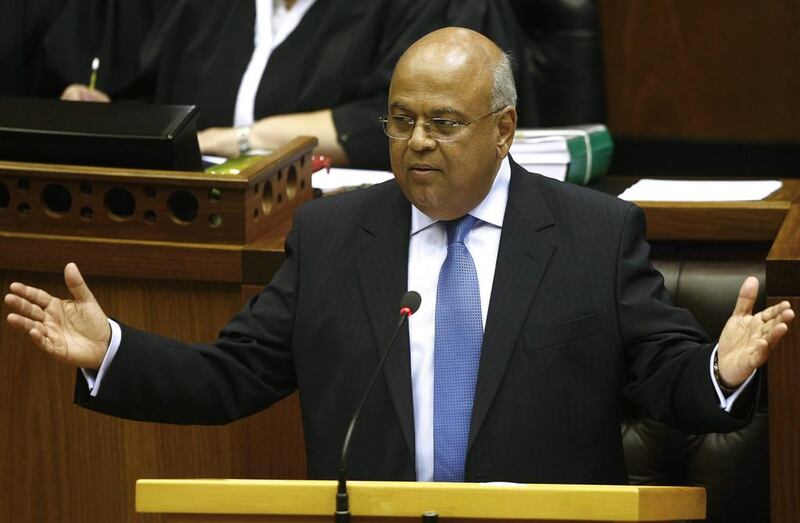CAPE TOWN // Until last Thursday, the South African rand was the world’s best-performing currency this year.
But following the president Jacob Zuma’s sacking of yet another finance minister, it has gone to the bottom of the table and now stands as the worst-performing of all the emerging markets. On Monday, S&P Global, citing “heightened political and institutional uncertainties” after the enforced exit of Pravin Gordhan, the country’s finance minster, cut the country’s long-term foreign currency rating to junk status. Moody’s is expected to follow shortly, threatening to knock another notch off the investment grade.
Mr Gordhan, a man of rock-ribbed integrity in a government racked with corruption and inefficiency, is not going quietly. The lifelong African National Congress loyalist and freedom fighter has now pledged his full support to a campaign that might just provide the impetus to force out a president who no longer seems to care what collateral damage he does to an economy already weakened after eight years of mis-rule.
A message on social media calling for a mass protest and a “nationwide shutdown” on Friday has gone viral, causing the visibly shaken Zuma presidency to bluster that “those found guilty of any form of violence will face the might of the law”. There used to be a time when public demonstrations were the lifeblood of the ANC, its main weapon of protest against the apartheid regime. Now the boot is on the other foot.
The surprise is that the plight of the rand is not worse. When Mr Zuma took over as president in 2009, it was trading at just over 7 rand to the US dollar. On Tuesday, it fell to 14 rand, a drop of 11 per cent in less than a week. Yet despite S&P’s dire warnings that Mr Gordhan’s dismissal will “put at risk fiscal and growth outcomes”, the reaction on international markets has been surprisingly mild. There was no mass dumping of South African bonds, as there was in December 2015 when Mr Zuma went through three finance ministers in a single week, and there were reports that international investors were standing by waiting for the right moment to reinvest.
The fact is that international investors like South Africa and in normal times lend it about US$1 billion a week. Even now they are reluctant to let go of their hopes for a turnaround and are prepared to sit out this particular crisis. Probably half the fall is technical, the unwinding of complicated trades designed to anticipate this very event.
Mr Gordhan’s sacking was well signposted, although no less unwelcome to international markets for that. He had done much to restore faith in the resilience of the economy, refusing to endorse the president’s wilder plans for “radical transformation”, concentrating instead on controlling government spending, bringing down inflation and reducing the budget deficit. This week, while backing the countrywide anti-Zuma protests, he reiterated his belief that the economy was resilient enough to pull through – in the right hands.
The immediate problem is that it is not in the right hands. His successor, Malusi Gigaba, comes with no financial credentials and a record of disastrous administration in his previous state roles. His one qualification is his unquestioning support for Mr Zuma, who has now completed his task of surrounding himself with a full complement of compliant ministers. Mr Gigaba is also yet another friend to the Guptas, the Indian-born family that exercises a mysterious hold on the president to the point where it can influence ministerial appointments – and has undoubtedly played a key role in the latest cabinet reshuffle. Mr Gordhan fiercely opposed Mr Zuma’s proposal for a huge nuclear programme that would require large quantities of uranium – and guess who owns some of South Africa’s biggest uranium deposits? Yes – the Guptas.
The good news is that Mr Zuma this time may have gone too far. His firing of Mr Gordhan and another eight ministers has roused even the ire of his deputy, Cyril Ramaphosa, and the ANC’s secretary general Gwede Mantashe, as well as the communist party and the trade union movement, his partners in the ruling coalition. His support has shrunk to a narrow clique of apparatchiks who carry little weight in a party that is long on tradition and respect for its elders.
The process for unseating him, however, is a difficult one. Both Mr Ramaphosa and F W de Klerk, the two major figures behind the drafting of South Africa’s otherwise admirable constitution, now bitterly regret the fact that it contained no mechanism for removing a sitting president. But the combination of fierce opposition from his own party, public demonstrations and international markets may combine to do the deed for them.
In that case, the rand will rally – and that’s why international investors are keeping the faith.
Ivan Fallon is a former business editor of The Sunday Times.
business@thenational.ae
Follow The National's Business section on Twitter





